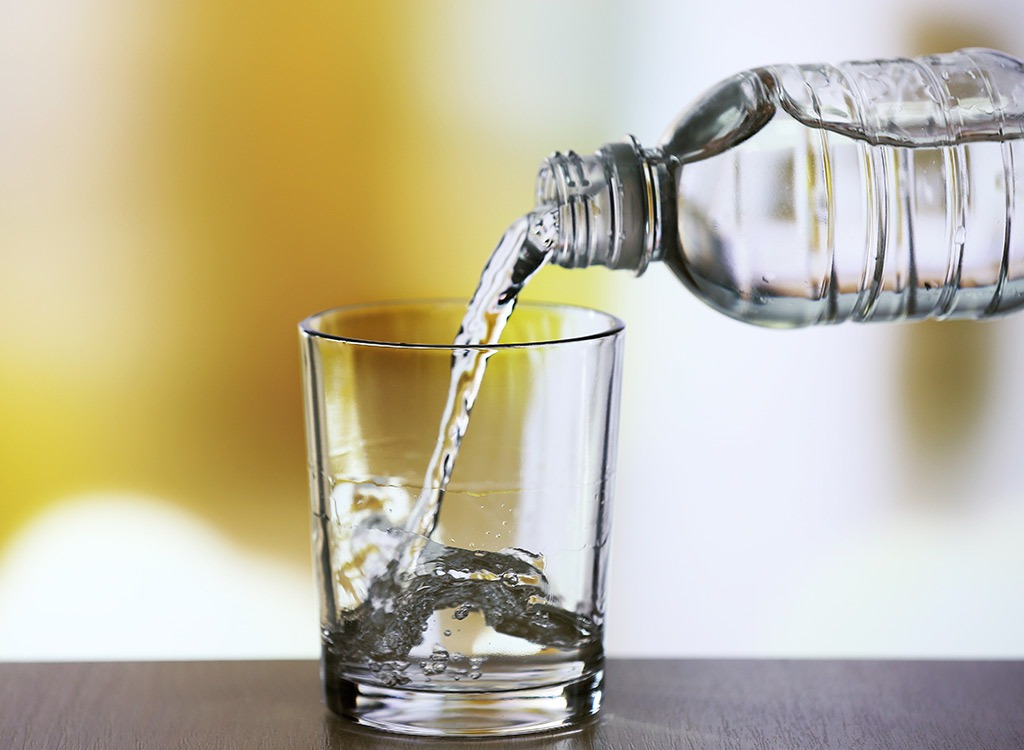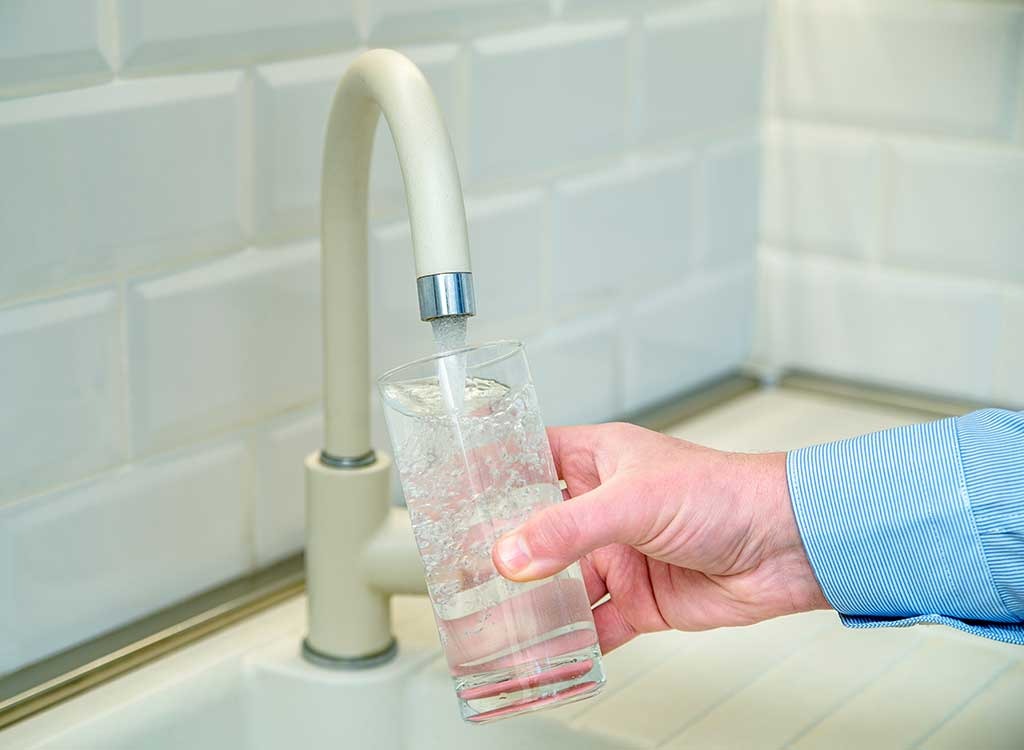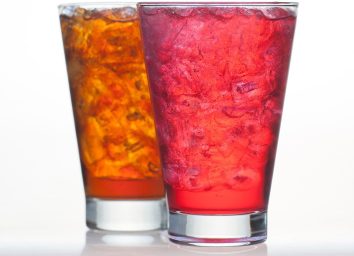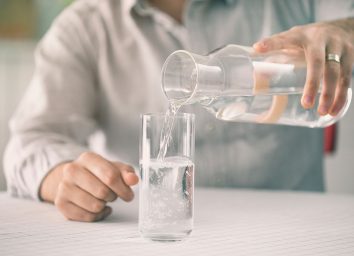How Your Bottled Water Stacks Up Against Tap

Turns out, bottled water companies aren't just trying to confuse the average H2O guzzler by plastering their bottles with labels like "Mineral," "Alkaline," and "Artesian."
According to Kris Sollid, RD, senior director of nutrition communications at the International Food Information Council Foundation (IFIC), bottled water is regulated by the Food and Drug Administration (FDA) according to standards of identity: "Alkaline, mineral and artesian aren't just fancy names, they actually mean something," he says.
Here's how the types of water differ—and the proposed benefits of each.
Alkaline Water

This simply means the bottled water has a slightly higher pH than other forms. You may recall from chemistry class that the pH scale measures how acidic or alkaline a substance is. On a scale from zero to 14, any pH below seven indicates a substance is acidic (vinegar hovers around two or three). On the other hand, anything above seven indicates a substance is alkaline (ammonia is around 11 or 12). Seven—which is the typical pH of tap water—is neutral. Most bottled waters are slightly acidic (pH below seven), while alkaline waters hover around eight or nine, Sollid says.
Some claim that drinking alkaline water can neutralize the acid in your body, which may prove helpful for people with acid reflux. However, Sollid argues that this isn't true: "The pH of our body is a tightly-controlled process that even the most expensive bottled water can't interrupt," he says. In addition, the Mayo Clinic states plain water is best for most of us, as research on the benefits of alkaline water is lacking.
Mineral Water

In order to classify as "mineral water," the H2O must come from an underground source and contain at least 250 parts-per-million of total dissolved solids like zinc, iron, and chloride, Sollid says. However, none of these minerals or trace elements can be added in—they must occur naturally.
According to Sollid, most varieties of mineral water contain more minerals than tap and artesian water. It could also be beneficial if your intake of certain minerals—namely calcium or magnesium—is typically low.
For example, sulfate- and magnesium-rich mineral waters (roughly 200 milligrams per liter of sulfate and 50 milligrams per liter of magnesium) may help with constipation, according to research in the European Journal of Nutrition. Meanwhile, mineral water high in calcium may shore up bone density, making it especially beneficial for women and children. A study published in Journal of Bone and Mineral Research found that boosting calcium intake by 100 milligrams per day via drinking water was associated with up to a 0.5 percent increase in femoral bone density in women over the age of 75.
That said, mineral quantities vary widely among tap and bottled water, and both water sources may contain high levels of calcium, magnesium, and sodium, according to research published in the Journal of General Internal Medicine. In fact, half of the tap water sources analyzed would provide between eight and 16 percent of your daily recommended intake (RDI) of calcium and between six and 31 percent of your RDI of magnesium if you drink two liters per day. So, buying a pricey bottle of mineral water doesn't guarantee you're getting more minerals than tap water.
And besides, you shouldn't rely on mineral water to fill nutrient gaps in your diet. "Eating a healthy diet and drinking tap water is better for you than drinking mineral or artesian water and eating a less healthy diet," Sollid says.
Artesian Water

Sounds fancy, but Sollid says "artesian" simply means the water was collected from a well that taps into an aquifer, or underground permeable rock. In fact, artesian water is no different from other bottled water taken from springs, says the scientific agency U.S. Geological Survey.
Depending on the water source, a bottle of artesian water may contain any number of naturally-occurring minerals, including silica, magnesium, and calcium. But according to multiple artesian water companies—including Nakd and VOSS—the mineral levels are low, which supposedly gives the water a pure, clean taste.
While artesian water companies like VOSS and Nakd claim that drinking their water will help you fight colds, improve concentration and keep skin youthful, there's no research to support these benefits.
"The only difference between artesian water and tap water is the cost," Sollid says.
What Does This Mean for Tap Water?

According to Sollid, the only real differences between bottled and tap are in sourcing and delivery. Tap water comes from public water systems, while bottled water sources vary and are delivered in sanitary, sealed containers.
"Although people may make a big deal out of the difference between tap and bottled water, the differences are minimal," Sollid says. "At the end of the day, the type of water you choose to drink, whether it be tap or bottled, has no impact on health."
What does impact health? Hydration. After all, water is essential for breaking down the foods we eat and moving them throughout the digestive system. It's also essential for eliminating toxins through urine and dissolving electrolytes. In fact, virtually every process in our body requires water.
No matter what kind of water you drink, be sure to drink plenty of it throughout the day. As a rough guideline, the IFIC Foundation suggests that adults down nine to 13 8-ounce glasses of water per day. Keep in mind that you may need more or less according to your activity level.
Good old-fashioned H20 is always your best bet to stay hydrated, but foods high in water content, like watermelon, strawberries, celery, cucumbers, as well as other beverages like tea, smoothies, and juice will also contribute to your daily water needs.








